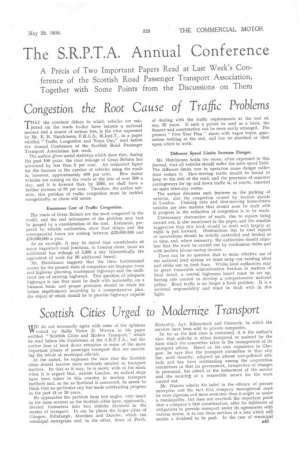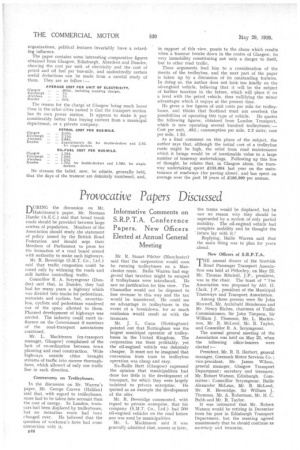Scottish Cities Urged to Modernize Transport
Page 57

Page 58

If you've noticed an error in this article please click here to report it so we can fix it.
VV/E do not necessarily agree with some of the opinions VV voiced by Bailie Victor D. Warren in his paper entitled "Scottish Cities and Modern Transport," which he read before the Conference of the S.R.P.T.A., but the author does at least ditect attention to some of the more important phases of passenger transport that are exercising the minds of municipal officials.
At the outset, he expresses the view that the Scottish cities should become more modernly minded in transport matters. Be that as it may, he is surely wide of the mark when it is argued that, outside London, no radical steps have been taken in this country in modern transport methods and, so far as Scotland is concerned, he seems to think that no particular city has made outstanding progress in the past 15 or 20 years.
He approaches the problem from two angles, very much in the same manner as the Scottish cities have, apparently, divided themselves into two definite divisions in the matter of transport. In one he places the larger cities of Glasgow, Edinburgh, Aberdeen and Dundee, which run municipal enterprises and, in the other, those of Perth, Kirkcaldy, Ayr, Kilmarnock and Greenock, in which the services have been sold to private companies.
So far as the first class is concerned, it is the author's view that activity is either hampered or assisted by the form which the committee takes in the management of its transport affairs. Based on his own experience in Glasgow, he says that the transport committee in that city bas, until recently, adopted an almost non-political attitude and has been outstanding among the corporation committees in that its government, irrespective of changes in personnel, has aimed at the betterment of the service and the securint of a reasonable return for the work carried out.
Mr. Warren admits his belief in the efficacy of private enterprise and the fact that company management must be more rigorous and more economic than it might be under a municipality, but does not overlook the important point that a company's first consideration, after its fulfilment of obligations to provide transport under its agreements with various towns. is to run those services at a rate which will enable a dividend to be paid. In the case of municipal organizations, political features invariably have a retarding influence.
The paper contains some interesting comparative figures obtained from Glasgow, Edinburgh, Aberdeen and Dundee, showing the cost per unit of electricity and the .cost of petrol and oil fuel per bus-mile, and undoubtedly certain useful deductions can be made from a careful study of them. They are as follow:—
The reason for the charge at Glasgow being much lower than in the other cities named is that the transport section has its own power station. It appears to make it pay considerably better than buying current from a 'municipal department, or a private company.
He stresses the belief, now, he admits, generally held, that the days of the tramcar are definitely numbered, and, in support of this view, points to the chaos which results when a tramcar breaks down in the centre of Glasgow, its very immobility constituting not only a danger to itself, but to other road traffic.
These arguments lead him to a consideration of the merits of the trolleybus, and the next part of the paper is taken up by a discussion of its outstanding features. In doing so, the author does not look, too kindly on the oil-engined vehicle, believing that it will be the subject of further taxation in the future, which will place it on a level with the petrol vehicle, thus nullifying the minor advantages which it enjoys at the present time.
He gives a few figures of unit costs per mile for trolleybuses, and thinks that Scotland must not overlook the possibilities of operating this type of vehicle, He quotes the following figures, obtained from London Transport, which is now operating several hundred trolleybuses :— Cost per unit, .45d.; consumption per mile, 2.2 units; cost per mile, 1.2d.
As a final comment on this phase of the subject, the author says that, although the initial cost of a trolleybus route might be high, the relief from road maintenance which it brings would be of inestimable value to a large number of tramway undertakings. Following up this line of thought, he relates that, in Glasgow alone, the tramway undertaking spent £155,694 last year on the maintenance of roadways (for paving alone), and has spent an average over the past 10 years of £186,000 per annum.




























































































